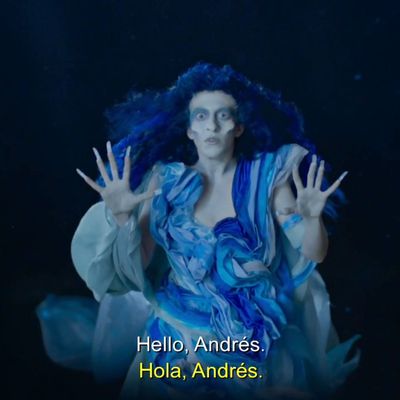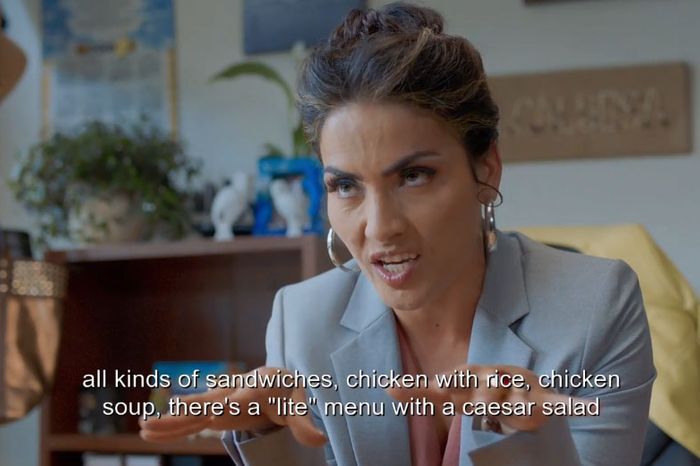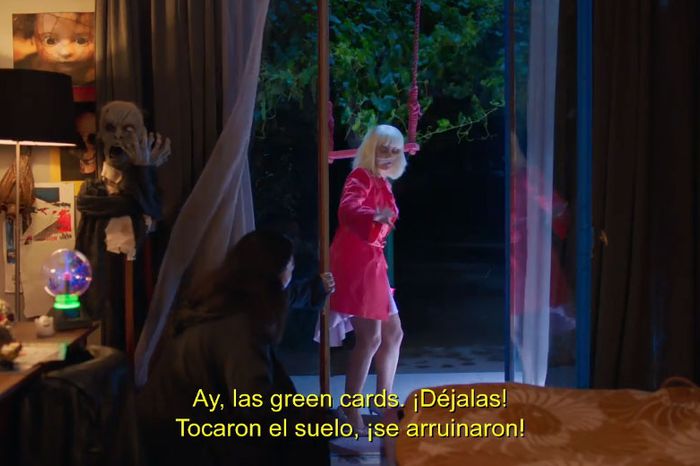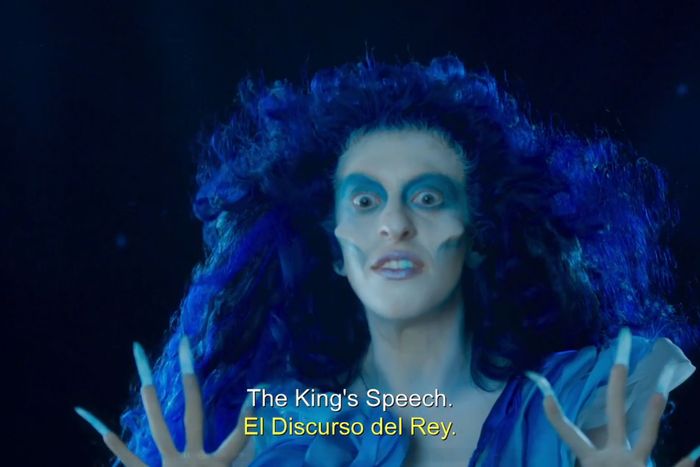
Los Espookys was always meant to be a bilingual show. As co-creators Julio Torres and Ana Fabrega designed it, the oddball HBO comedy moves between America and a fictional South or Latin American country, with characters who speak English, Spanish, slang combinations thereof, and sometimes even mystical whooshing noises. It’s an especially distinctive choice onscreen: Every line of dialogue is subtitled, whether in English (if characters are speaking Spanish), Spanish (if they’re speaking English), or both (if they are doing some mystical whooshing). “It felt like a thing that we hadn’t verbalized, but we assumed from the beginning,” Torres tells Vulture. “Of course when the Americans speak, they’ve got to be subtitled too. It’s not an American show pretending to be a Latin American show. It’s both.”
In the process of making a bilingual show, however, the creators had to figure out how Los Espookys remained both comprehensible — and crucially, funny — in its dialogue and the subtitles that translated it. They wrote the show in English, the language that felt most comfortable to them, while trying to avoid English idioms that might sound awkward when translated into Spanish. “Spanish is my first language, but my career has been in English,” Torres said. “So it was an interesting exercise of being like, How do I do the two at the same time?”
Because the dialogue changed as the actors performed and the crew edited the show together, Fabrega and Torres also had to figure out how to translate the finished product into another language with subtitles. As they discussed with Decider, they spent a lot of time trying to match the pacing of the subtitles with the pacing of the jokes, making sure the punch lines arrived in Spanish and English at the same time. They also paid close attention to the eccentricities of each language. “There were a few moments where the subtitles aren’t direct translations, but they’re the closest to what the sentiment is in whatever language that’s being spoken,” Fabrega said.
In some cases, they simplified the dialogue to make the subtitles easier to read quickly; in others, it was funnier to mirror exactly what was performed. In episode two, when a nun (Carolina Paulsen Lynch) is reminded that the inheritance from a handrail fortune won’t go to her but to some orphans, the actor playing the nun improvised in Spanish, “Ah, yes, of course, the orphans. Yes, yes, the little ones. Yes, obviously, of course,” which Los Espookys subtitled in full on the screen, instead of simply what was in the script: “Yes, of course.” “Even if it seems so dumb and repetitive,” Torres said, “You want to get the essence of who this woman is.”
Some idioms, however, are too specific or difficult to translate. In episode three, the mayor of a small town (Carmen Gloria Bresky) tries to pay Los Espookys with a voucher to a shrimp-themed restaurant called Camaroncitos — literally, “little shrimp,” though the show doesn’t translate it — that serves a variety of foods, including sandwiches, which the mayor calls “sansweeshes.” Bresky’s delivery, according to Torres, winks at a tendency among some Latin Americans to “take a big swing” at pronouncing words in English, only to get them wrong. “It’s like the cultural equivalent to an American saying, ‘Barthelona,’” Torres said. The episode just uses the word “sandwich” in the English subtitle, given that would be a difficult quirk to explain. “That is one of the few moments in the show where I was like, This is not going to be conveyed to both,” Torres said.
Similarly, a few jokes written in English proved difficult to capture with Spanish subtitles. Torres and Fabrega wanted to make sure that the U.S. Ambassador Melanie Gibbons (Greta Titelman), a ditz who talks and acts like she’s a contestant on The Bachelor, had the same tone in both languages. “These shouldn’t be dry, boring translations,” Torres remembered thinking, “These should convey who this woman is in Spanish.” Some of Melanie’s dialogue was particularly tough to translate, like when she drops a bunch of green cards and announces, ‘They’ve touched the ground, now they’ve gone bad!’” The joke depends on the English idiom of “gone bad,” which Fabrega and Torres knew was hard to translate into Spanish, so they settled on “se arruinaron,” which is closer to “they were ruined.”
But one of the most difficult characters to write subtitles for didn’t speak at all. In the fourth episode, “El espejo maldito (The Cursed Mirror),” Torres’s character, Andrés, converses with the mysterious Water Shadow (Spike Einbinder) that promises to tell him the secrets of his past, if he promises to show it The King’s Speech. Water Shadow only expresses itself in weird whooshes and sighs, necessitating two rows of subtitles in English and Spanish, which ended up limiting the writers’ options. “Water Shadow was way more verbose on script,” Torres said, noting that the original dialogue was “mystical long riddles” that they cut down into much smaller segments so they’d be able to fit two translations onscreen. “We only have so much footage with the right expressions for the line that’s being conveyed,” Fabrega said, “We also can’t make the scene super long just to get all the dialogue we want.”
In filling their show with subtitles, Fabrega and Torres inadvertently made something built for sharing on the internet, where close-captioned screenshots travel easily, even when divorced from their original context. Fabrega joked on Twitter that HBO told them each frame of the show “had to be a meme,” but once the show started to air, she said she realized that it really did double as a meme generator. “Whenever I saw the framing of [a subtitle],” Torres added, “I would think, Oh, this is going to be so funny with this little word under it. It’s almost accidentally a show made for Tumblr.”





